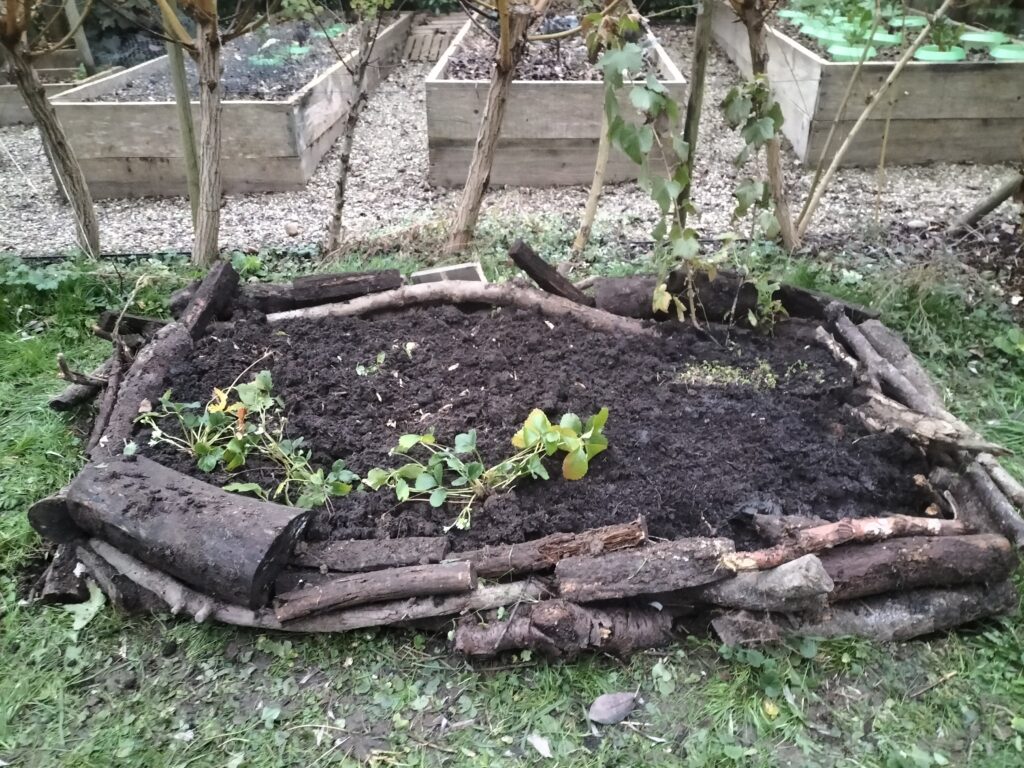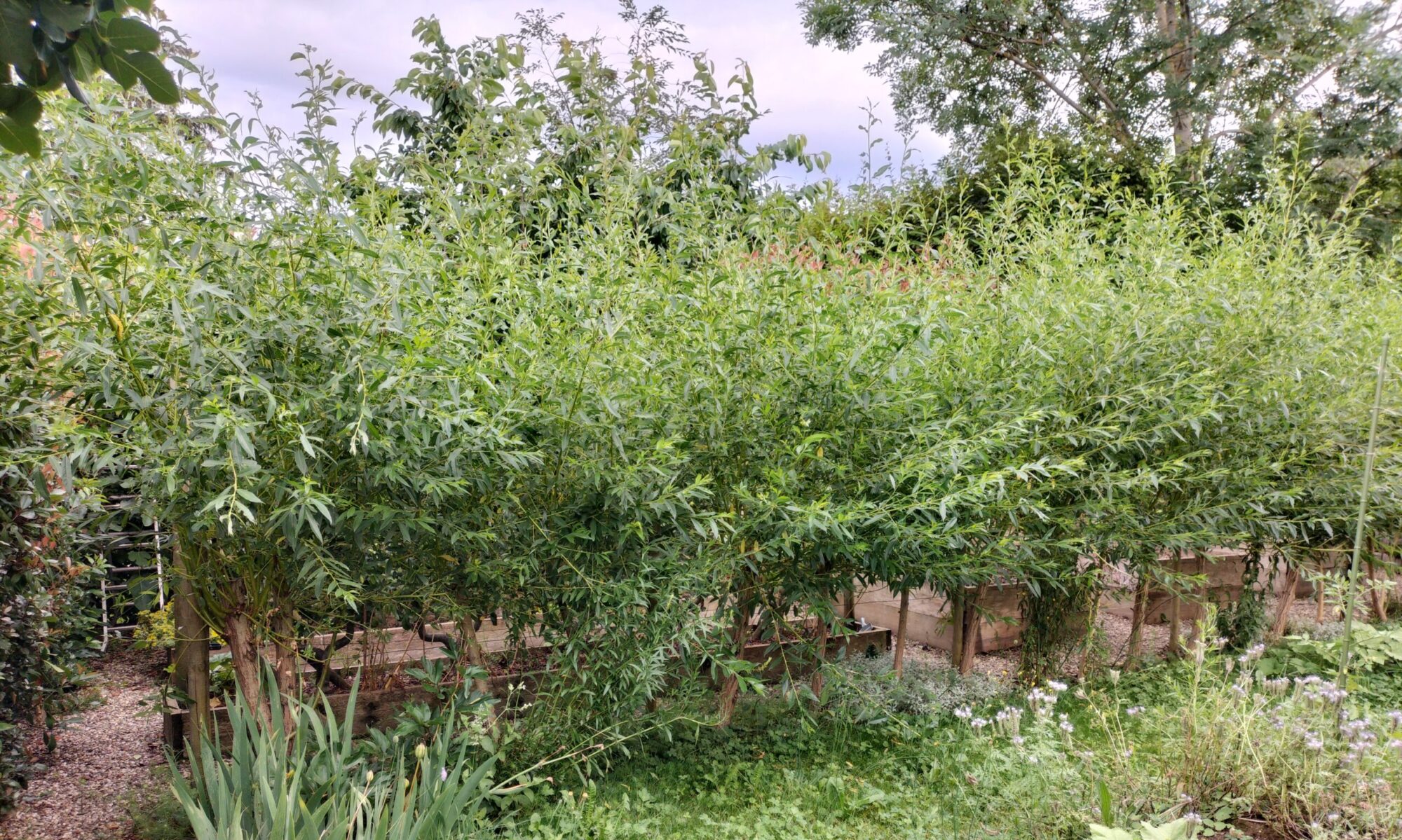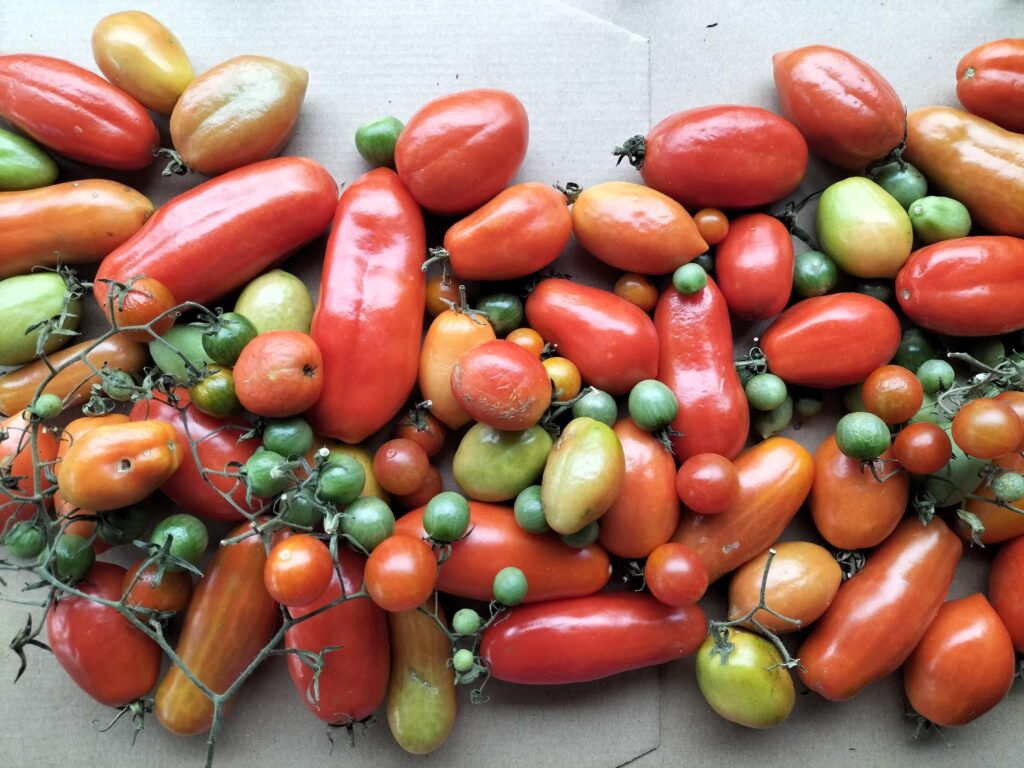
This used to be a Hügelkultur bed, but that didn’t really work, so I’ve taken it apart and turned it inside out. I imagine this is what a Hobbit’s vegetable patch might look like.
This is a reflection on the readings for the penultimate Sunday before Advent: Hebrews 10:11-25, Mark 13:1-8 and Daniel 12:1-3.
I confess to having something of a morbid fascination with post-apocalyptic fiction. I think it has to do with growing up in the shadow of the cold war fearful of nuclear annihilation, and then there was the hole in the ozone layer, acid rain and now climate change. Perhaps a subconscious part of me needs to face the worst possible outcomes in a safe, contained way in order for me to feel able to cope with an uncertain future.
Our three readings for today fit nicely into the apocalyptic genre. The prophet Daniel describes a time of great anguish, such as has never occurred since nations first came into existence. Then in the Gospel, Jesus talks of the destruction of the temple, of wars and rumours of wars, of famines and earthquakes. The passage from Hebrews ends with a cryptic comment about the Day (with a capital D) which is approaching. It is this concept of the Day, the Day of the Lord, that can help us find meaning in these passages and seek a constructive way forward.
In the Jewish imagination, in Biblical times, the Day of the Lord was the moment when God would break into history and take charge, bringing justice and restoring God’s chosen people to their proper place in the world. But before that Day, there would be a time of terror and trouble when the world would be shaken to its foundations and judgment would come.
The Old Testament prophets warned about this great suffering, we’ve already heard from Daniel, so let’s hear from Isaiah, who is no less terrifying:
See, the day of the Lord comes, cruel, with wrath and fierce anger, to make the earth a desolation, and to destroy its sinners from it.
This so-called apocalyptic literature, is a blend of terror and ultimate hope, driven along by God’s purposes.
Probably the most famous apocalyptic writing in the Bible is the book of Revelation, found at the very end of the New Testament. As with the rest of the genre, its imagery is not meant to be taken literally, it is symbolic language that gives hope that suffering isn’t entirely pointless, that somehow, something good will come out of it.
Our gospel reading today is part of what has been called the mini apocalypse, which takes up most of the rest of Mark 13. It makes for disturbing and perplexing reading. Jesus uses the familiar apocalyptic style to warn his disciples against being led astray by false teachers, he tells them not to be alarmed but to be patient until the end.
He warns that there will be wars and rumours of wars, that nation will rise against nation, and kingdom against kingdom; that there will be earthquakes in various places and famines. And not only that, but this is just the beginning of the birth pangs. The disciples would have understood this as the build up to the glorious Day of the Lord and the defeat of their enemies. But Jesus subverts this idea by talking about birth pangs – this is an image not of vengeance and victory, but of the hope of new birth!
I wonder how you feel when you hear these words about liars rising to prominence and leading many astray? About wars and rumours of wars, conflict, earthquakes and famines? Does this seem pertinent to you? It certainly does to me, and why not add droughts, floods, hurricanes and forest fires to the mix. I find it interesting that Jesus promised us such terrible things and then counselled us not to be alarmed about them.
Let’s rewind a minute and look back at what prompted Jesus to speak these words. The disciples had been admiring the temple and trying to get Jesus to share in their wonder. The temple was a vast structure, with some of the stones being as big as 40 by 12 by 18 feet, no wonder the disciples were impressed by them. This incredibly imposing structure was not only the focus of religious ritual, but held the Holy Scriptures, the highest court of Jewish law and the presence of God himself.
But rather than join in their admiration of the temple, Jesus prophesies its destruction, and, in less than 50 years, this astonishing prophecy came tragically true. The temple was destroyed during the siege of Jerusalem in which over a million people perished by famine and the sword, and between 60 and 100 thousand people were enslaved, taken to Rome and forced to build the Colosseum – that theater of terror where as many as 400,000 people died in bloody spectacles.
The catastrophic collapse of the city and its temple must have felt like the end of the world. And yet, somehow, life went on. It was an end, but not the end, it was but the beginning of the birth pangs that Jesus talked about.
Zooming outwards, we can see that other ends of the world have happened throughout history, for example, the fall of the Roman empire which plunged Western Europe into turmoil, the industrial revolution, which despite its many advantages has wrought untold ecological damage, and the discovery of the ‘New World’, which was a total catastrophe for the indigenous peoples of the Americas.
These experiences of political, social and ecological collapse are so painful and difficult, it’s as if the body of history has been wracked with waves of intense pain over and over again. These are the birth pangs.
Since the end of 2nd world war, those of us in the global north have had something of a reprieve, and we can be incredibly grateful for the peace, prosperity and security and that we have known in our time, but we cannot imagine that it will last forever. Our status quo is declining and falling. Another birth pang.
Like all good midwives, Jesus tells us not to be alarmed when the birth pangs come – don’t panic, just breathe. Like a labouring mother who is driven along by forces within her body that she cannot control – we are living within systems and structures that we cannot control. Like an expectant mother, perhaps the best thing we can do is decide to keep breathing, to not be alarmed, but to be islands of peace in a world reeling from the pain.
When alarming news comes in from all over the globe and when the things we thought were as stable and certain as the Jerusalem temple start to unravel, how are we to respond?
The writer of the letter to the Hebrews has some clear advice.
His readers were living through persecution and trials, and he encourages them not to give up – he tells them (and us) to hold fast to the confession of our hope without wavering, for he who has promised is faithful. He doesn’t tell us to keep going because everything will be OK in the end, but encourages us to keep faith in God because of who God is. He talks of a true heart in full assurance of faith, this speaks to our attitude – that we don’t let ourselves be destroyed by the awfulness of what is going on around us, that we don’t become cynical and depressed, but rather we choose to keep believing in the goodness of God.
He challenges us to consider how we might provoke each another to love and good deeds, it makes me think back to our auction the other week, where we drove up the prices by bidding against each other. I wonder who has inspired you to grow in your faith, to live better or simply to keep going when things are difficult?
The author recognises that in the face of the pressures of life, some had given up and stopped meeting together, but he stresses how important it is for us to keep meeting up to encourage each other, and all the more as we see the Day approaching. We are part of each other, and we cannot afford to give up on our community. The worse things get on a social, economic and ecological level, the more important it will be to draw together, not drift apart.
Birth pangs start off gently, a minor irritation, but soon build in strength and frequency until the body is overwhelmed by waves of increasingly unbearable pain. And yet, the pain is just about bearable because you know it won’t last and that there will new life at the end of it.
But what will the labour of our suffering world bring to birth?
There’s no easy answer to this, we might just have to refer back to the Hebrews passage that encourages us to trust that God is faithful. Or we might look to Romans 8, which talks about creation groaning in the pain of labour, and points towards a time of future redemption.
But we can’t afford to let that make us complacent. Christ calls us to love our neighbour, to feed the hungry, welcome the stranger, clothe the naked and visit those in prison.
In the face of calamity, we are to respond with neither paralysing despair nor a false hope that relieves us of the responsibility to act, but with a virtuous cycle of meeting together to encourage and provoke each other to love and good deeds. By following the way of Christ, we will impact our collective well-being as well as the well-being of those around us, bringing positive change in a myriad of small and not so small ways. And for those things beyond the scope of our influence, we will just have to learn to leave them in the hands of our faithful God.

